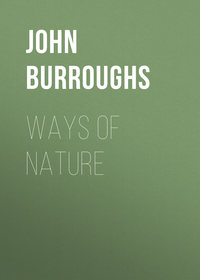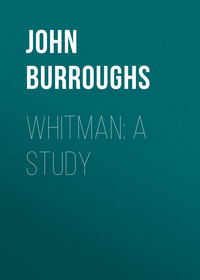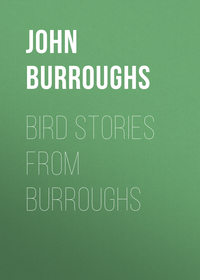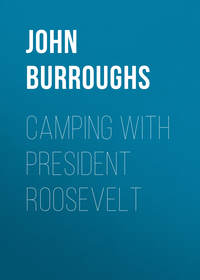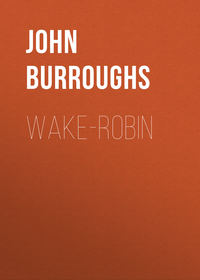 полная версия
полная версияCamping & Tramping with Roosevelt
One night in camp he told us the story of one of his Rough Riders who had just written him from some place in Arizona. The Rough Riders, wherever they are now, look to him in time of trouble. This one had come to grief in Arizona. He was in jail. So he wrote the President, and his letter ran something like this: —
"Dear Colonel, – I am in trouble. I shot a lady in the eye, but I did not intend to hit the lady; I was shooting at my wife."
And the presidential laughter rang out over the tree-tops. To another Rough Rider, who was in jail, accused of horse stealing, he had loaned two hundred dollars to pay counsel on his trial, and, to his surprise, in due time the money came back. The ex-Rough wrote that his trial never came off. "We elected our district attorney;" and the laughter again sounded, and drowned the noise of the brook near by.
On another occasion we asked the President if he was ever molested by any of the "bad men" of the frontier, with whom he had often come in contact. "Only once," he said. The cowboys had always treated him with the utmost courtesy, both on the round-up and in camp; "and the few real desperadoes I have seen were also perfectly polite." Once only was he maliciously shot at, and then not by a cowboy nor a bona fide "bad man," but by a "broad-hatted ruffian of a cheap and common-place type." He had been compelled to pass the night at a little frontier hotel where the bar-room occupied the whole lower floor, and was, in consequence, the only place where the guests of the hotel, whether drunk or sober, could sit. As he entered the room, he saw that every man there was being terrorized by a half-drunken ruffian who stood in the middle of the floor with a revolver in each hand, compelling different ones to treat.
"I went and sat down behind the stove," said the President, "as far from him as I could get; and hoped to escape his notice. The fact that I wore glasses, together with my evident desire to avoid a fight, apparently gave him the impression that I could be imposed upon with impunity. He very soon approached me, flourishing his two guns, and ordered me to treat. I made no reply for some moments, when the fellow became so threatening that I saw something had to be done. The crowd, mostly sheep-herders and small grangers, sat or stood back against the wall, afraid to move. I was unarmed, and thought rapidly. Saying, 'Well, if I must, I must,' I got up as if to walk around him to the bar, then, as I got opposite him, I wheeled and fetched him as heavy a blow on the chin-point as I could strike. He went down like a steer before the axe, firing both guns into the ceiling as he went. I jumped on him, and, with my knees on his chest, disarmed him in a hurry. The crowd was then ready enough to help me, and we hog-tied him and put him in an outhouse." The President alludes to this incident in his "Ranch Life," but does not give the details. It brings out his mettle very distinctly.
He told us in an amused way of the attempts of his political opponents at Albany, during his early career as a member of the Assembly, to besmirch his character. His outspoken criticisms and denunciations had become intolerable to them, so they laid a trap for him, but he was not caught. His innate rectitude and instinct for the right course saved him, as it has saved him many times since. I do not think that in any emergency he has to debate with himself long as to the right course to be pursued; he divines it by a kind of infallible instinct. His motives are so simple and direct that he finds a straight and easy course where another man, whose eye is less single, would flounder and hesitate.
One night he entertained us with reminiscences of the Cuban War, of his efforts to get his men to the firing line when the fighting began, of his greenness and general ignorance of the whole business of war, which in his telling was very amusing. He has probably put it all in his book about the war, a work I have not yet read. He described the look of the slope of Kettle Hill when they were about to charge up it, how the grass was combed and rippled by the storm of rifle bullets that swept down it. He said, "I was conscious of being pale when I looked at it and knew that in a few moments we were going to charge there." The men of his regiment were all lying flat upon the ground, and it became his duty to walk along their front and encourage them and order them up on their feet. "Get up, men, get up!" One big fellow did not rise. Roosevelt stooped down and took hold of him and ordered him up. Just at that moment a bullet struck the man and went the entire length of him. He never rose.
On this or on another occasion when a charge was ordered, he found himself a hundred yards or more in advance of his regiment, with only the color bearer and one corporal with him. He said they planted the flag there, while he rushed back to fetch the men. He was evidently pretty hot. "Can it be that you flinched when I led the way!" and then they came with a rush. On the summit of Kettle Hill he was again in advance of his men, and as he came up, three Spaniards rose out of the trenches and deliberately fired at him at a distance of only a few paces, and then turned and fled. But a bullet from his revolver stopped one of them. He seems to have been as much exposed to bullets in this engagement as Washington was at Braddock's defeat, and to have escaped in the same marvelous manner.
The President unites in himself powers and qualities that rarely go together. Thus, he has both physical and moral courage in a degree rare in history. He can stand calm and unflinching in the path of a charging grizzly, and he can confront with equal coolness and determination the predaceous corporations and money powers of the country.
He unites the qualities of the man of action with those of the scholar and writer, – another very rare combination. He unites the instincts and accomplishments of the best breeding and culture with the broadest democratic sympathies and affiliations. He is as happy with a frontiersman like Seth Bullock as with a fellow Harvard man, and Seth Bullock is happy, too.
He unites great austerity with great good nature. He unites great sensibility with great force and will power. He loves solitude, and he loves to be in the thick of the fight. His love of nature is equaled only by his love of the ways and marts of men.
He is doubtless the most vital man on the continent, if not on the planet, to-day. He is many-sided, and every side throbs with his tremendous life and energy; the pressure is equal all around. His interests are as keen in natural history as in economics, in literature as in statecraft, in the young poet as in the old soldier, in preserving peace as in preparing for war. And he can turn all his great power into the new channel on the instant. His interest in the whole of life, and in the whole life of the nation, never flags for a moment. His activity is tireless. All the relaxation he needs or craves is a change of work. He is like the farmer's fields, that only need a rotation of crops. I once heard him say that all he cared about being President was just "the big work."
During this tour through the West, lasting over two months, he made nearly three hundred speeches; and yet on his return Mrs. Roosevelt told me he looked as fresh and unworn as when he left home.
We went up into the big geyser region with the big sleighs, each drawn by four horses. A big snow-bank had to be shoveled through for us before we got to the Golden Gate, two miles above Mammoth Hot Springs. Beyond that we were at an altitude of about eight thousand feet, on a fairly level course that led now through woods, and now through open country, with the snow of a uniform depth of four or five feet, except as we neared the "formations," where the subterranean warmth kept the ground bare. The roads had been broken and the snow packed for us by teams from the fort, otherwise the journey would have been impossible.
The President always rode beside the driver. From his youth, he said, this seat had always been the most desirable one to him. When the sleigh would strike the bare ground, and begin to drag heavily, he would bound out nimbly and take to his heels, and then all three of us – Major Pitcher, Mr. Childs, and myself – would follow suit, sometimes reluctantly on my part. Walking at that altitude is no fun, especially if you try to keep pace with such a walker as the President is. But he could not sit at his ease and let those horses drag him in a sleigh over bare ground. When snow was reached, we would again quickly resume our seats.
As one nears the geyser region, he gets the impression from the columns of steam going up here and there in the distance – now from behind a piece of woods, now from out a hidden valley – that he is approaching a manufacturing centre, or a railroad terminus. And when he begins to hear the hoarse snoring of "Roaring Mountain," the illusion is still more complete. At Norris's there is a big vent where the steam comes tearing out of a recent hole in the ground with terrific force. Huge mounds of ice had formed from the congealed vapor all around it, some of them very striking.
The novelty of the geyser region soon wears off. Steam and hot water are steam and hot water the world over, and the exhibition of them here did not differ, except in volume, from what one sees by his own fireside. The "Growler" is only a boiling tea-kettle on a large scale, and "Old Faithful" is as if the lid were to fly off, and the whole contents of the kettle should be thrown high into the air. To be sure, boiling lakes and steaming rivers are not common, but the new features seemed, somehow, out of place, and as if nature had made a mistake. One disliked to see so much good steam and hot water going to waste; whole towns might be warmed by them, and big wheels made to go round. I wondered that they had not piped them into the big hotels which they opened for us, and which were warmed by wood fires.
At Norris's the big room that the President and I occupied was on the ground floor, and was heated by a huge box stove. As we entered it to go to bed, the President said, "Oom John, don't you think it is too hot here?"
"I certainly do," I replied.
"Shall I open the window?"
"That will just suit me." And he threw the sash, which came down to the floor, all the way up, making an opening like a doorway. The night was cold, but neither of us suffered from the abundance of fresh air.
The caretaker of the building was a big Swede called Andy. In the morning Andy said that beat him: "There was the President of the United States sleeping in that room, with the window open to the floor, and not so much as one soldier outside on guard."
The President had counted much on seeing the bears that in summer board at the Fountain Hotel, but they were not yet out of their dens. We saw the track of only one, and he was not making for the hotel. At all the formations where the geysers are, the ground was bare over a large area. I even saw a wild flower – an early buttercup, not an inch high – in bloom. This seems to be the earliest wild flower in the Rockies. It is the only fragrant buttercup I know.
As we were riding along in our big sleigh toward the Fountain Hotel, the President suddenly jumped out, and, with his soft hat as a shield to his hand, captured a mouse that was running along over the ground near us. He wanted it for Dr. Merriam, on the chance that it might be a new species. While we all went fishing in the afternoon, the President skinned his mouse, and prepared the pelt to be sent to Washington. It was done as neatly as a professed taxidermist would have done it. This was the only game the President killed in the Park. In relating the incident to a reporter while I was in Spokane, the thought occurred to me, Suppose he changes that u to an o, and makes the President capture a moose, what a pickle I shall be in! Is it anything more than ordinary newspaper enterprise to turn a mouse into a moose? But, luckily for me, no such metamorphosis happened to that little mouse. It turned out not to be a new species, as it should have been, but a species new to the Park.
I caught trout that afternoon, on the edge of steaming pools in the Madison River that seemed to my hand almost blood-warm. I suppose they found better feeding where the water was warm. On the table they did not compare with our Eastern brook trout.
I was pleased to be told at one of the hotels that they had kalsomined some of the rooms with material from one of the devil's paint-pots. It imparted a soft, delicate, pinkish tint, not at all suggestive of things satanic.
One afternoon at Norris's, the President and I took a walk to observe the birds. In the grove about the barns there was a great number, the most attractive to me being the mountain bluebird. These birds we saw in all parts of the Park, and at Norris's there was an unusual number of them. How blue they were, – breast and all! In voice and manner they were almost identical with our bluebird. The Western purple finch was abundant here also, and juncos, and several kinds of sparrows, with an occasional Western robin. A pair of wild geese were feeding in the low, marshy ground not over one hundred yards from us, but when we tried to approach nearer they took wing. A few geese and ducks seem to winter in the Park.
The second morning at Norris's one of our teamsters, George Marvin, suddenly dropped dead from some heart affection, just as he had finished caring for his team. It was a great shock to us all. I never saw a better man with a team than he was. I had ridden on the seat beside him all the day previous. On one of the "formations" our teams had got mired in the soft, putty-like mud, and at one time it looked as if they could never extricate themselves, and I doubt if they could have, had it not been for the skill with which Marvin managed them. We started for the Grand Cañon up the Yellowstone that morning, and, in order to give myself a walk over the crisp snow in the clear, frosty air, I set out a little while in advance of the teams. As I did so, I saw the President, accompanied by one of the teamsters, walking hurriedly toward the barn to pay his last respects to the body of Marvin. After we had returned to Mammoth Hot Springs, he made inquiries for the young woman to whom he had been told that Marvin was engaged to be married. He looked her up, and sat a long time with her in her home, offering his sympathy, and speaking words of consolation. The act shows the depth and breadth of his humanity.
At the Cañon Hotel the snow was very deep, and had become so soft from the warmth of the earth beneath, as well as from the sun above, that we could only reach the brink of the Cañon on skis. The President and Major Pitcher had used skis before, but I had not, and, starting out without the customary pole, I soon came to grief. The snow gave way beneath me, and I was soon in an awkward predicament. The more I struggled, the lower my head and shoulders went, till only my heels, strapped to those long timbers, protruded above the snow. To reverse my position was impossible till some one came and reached me the end of a pole, and pulled me upright. But I very soon got the hang of the things, and the President and I quickly left the superintendent behind. I think I could have passed the President, but my manners forbade. He was heavier than I was, and broke in more. When one of his feet would go down half a yard or more, I noted with admiration the skilled diplomacy he displayed in extricating it. The tendency of my skis was all the time to diverge, and each to go off at an acute angle to my main course, and I had constantly to be on the alert to check this tendency.
Paths had been shoveled for us along the brink of the Cañon, so that we got the usual views from the different points. The Cañon was nearly free from snow, and was a grand spectacle, by far the grandest to be seen in the Park. The President told us that once, when pressed for meat, while returning through here from one of his hunting trips, he had made his way down to the river that we saw rushing along beneath us, and had caught some trout for dinner. Necessity alone could induce him to fish.
Across the head of the Falls there was a bridge of snow and ice, upon which we were told that the coyotes passed. As the season progressed, there would come a day when the bridge would not be safe. It would be interesting to know if the coyotes knew when this time arrived.
The only live thing we saw in the Cañon was an osprey perched upon a rock opposite us.
Near the falls of the Yellowstone, as at other places we had visited, a squad of soldiers had their winter quarters. The President called on them, as he had called upon the others, looked over the books they had to read, examined their housekeeping arrangements, and conversed freely with them.
In front of the hotel were some low hills separated by gentle valleys. At the President's suggestion, he and I raced on our skis down those inclines. We had only to stand up straight, and let gravity do the rest. As we were going swiftly down the side of one of the hills, I saw out of the corner of my eye the President taking a header into the snow. The snow had given way beneath him, and nothing could save him from taking the plunge. I don't know whether I called out, or only thought, something about the downfall of the administration. At any rate, the administration was down, and pretty well buried, but it was quickly on its feet again, shaking off the snow with a boy's laughter. I kept straight on, and very soon the laugh was on me, for the treacherous snow sank beneath me, and I took a header, too.
"Who is laughing now, Oom John?" called out the President.
The spirit of the boy was in the air that day about the Cañon of the Yellowstone, and the biggest boy of us all was President Roosevelt.
The snow was getting so soft in the middle of the day that our return to the Mammoth Hot Springs could no longer be delayed. Accordingly, we were up in the morning, and ready to start on the home journey, a distance of twenty miles, by four o'clock. The snow bore up the horses well till mid-forenoon, when it began to give way beneath them. But by very careful management we pulled through without serious delay, and were back again at the house of Major Pitcher in time for luncheon, being the only outsiders who had ever made the tour of the Park so early in the season.
A few days later I bade good-by to the President, who went on his way to California, while I made a loop of travel to Spokane, and around through Idaho and Montana, and had glimpses of the great, optimistic, sunshiny West that I shall not soon forget.
PRESIDENT ROOSEVELT AS A NATURE-LOVER AND OBSERVER
Our many-sided President has a side to his nature of which the public has heard but little, and which, in view of his recent criticism of what he calls the nature fakirs, is of especial interest and importance. I refer to his keenness and enthusiasm as a student of animal life, and his extraordinary powers of observation. The charge recently made against him that he is only a sportsman and has only a sportsman's interest in nature is very wide of the mark. Why, I cannot now recall that I have ever met a man with a keener and more comprehensive interest in the wild life about us – an interest that is at once scientific and thoroughly human. And by human I do not mean anything akin to the sentimentalism that sicklies o'er so much of our more recent natural history writing, and that inspires the founding of hospitals for sick cats; but I mean his robust, manly love for all open-air life, and his sympathetic insight into it. When I first read his "Wilderness Hunter," many years ago, I was impressed by his rare combination of the sportsman and the naturalist. When I accompanied him on his trip to the Yellowstone Park in April, 1903, I got a fresh impression of the extent of his natural history knowledge and of his trained powers of observation. Nothing escaped him, from bears to mice, from wild geese to chickadees, from elk to red squirrels; he took it all in, and he took it in as only an alert, vigorous mind can take it in. On that occasion I was able to help him identify only one new bird, as I have related in the foregoing chapter. All the other birds he recognized as quickly as I did.
During a recent half-day spent with the President at Sagamore Hill I got a still more vivid impression of his keenness and quickness in all natural history matters. The one passion of his life seemed natural history, and the appearance of a new warbler in his woods – new in the breeding season on Long Island – seemed an event that threw the affairs of state and of the presidential succession quite into the background. Indeed, he fairly bubbled over with delight at the thought of his new birds and at the prospect of showing them to his visitors. He said to my friend who accompanied me, John Lewis Childs, of Floral Park, a former State Senator, that he could not talk politics then, he wanted to talk and to hunt birds. And it was not long before he was as hot on the trail of that new warbler as he had recently been on the trail of some of the great trusts. Fancy a President of the United States stalking rapidly across bushy fields to the woods, eager as a boy and filled with the one idea of showing to his visitors the black-throated green warbler! We were presently in the edge of the woods and standing under a locust tree, where the President had several times seen and heard his rare visitant. "That's his note now," he said, and we all three recognized it at the same instant. It came from across a little valley fifty yards farther in the woods. We were soon standing under the tree in which the bird was singing, and presently had our glasses upon him.
"There is no mistake about it, Mr. President," we both said; "it is surely the black-throated green," and he laughed in glee. "I knew it could be no other; there is no mistaking that song and those markings. 'Trees, trees, murmuring trees!' some one reports him as saying. Now if we could only find the nest;" but we did not, though it was doubtless not far off.
Our warblers, both in color and in song, are bewildering even to the experienced ornithologist, but the President had mastered most of them. Not long before he had written me from Washington that he had just come in from walking with Mrs. Roosevelt about the White House grounds looking up arriving warblers. "Most of the warblers were up in the tops of the trees, and I could not get a good glimpse of them; but there was one with chestnut cheeks, with bright yellow behind the cheeks, and a yellow breast thickly streaked with black, which has puzzled me. Doubtless it is a very common kind which has for the moment slipped my memory. I saw the Blackburnian, the summer yellowbird, and the black-throated green." The next day he wrote me that he had identified the puzzling warbler; it was the Cape May. There is a tradition among newspaper men in Washington that a Cape May warbler once broke up a Cabinet meeting; maybe this was that identical bird.
At luncheon he told us of some of his ornithological excursions in the White House grounds, how people would stare at him as he stood gazing up into the trees like one demented. "No doubt they thought me insane." "Yes," said Mrs. Roosevelt, "and as I was always with him, they no doubt thought I was the nurse that had him in charge."
In his "Pastimes of an American Hunter" he tells of the owls that in June sometimes came after nightfall about the White House. "Sometimes they flew noiselessly to and fro, and seemingly caught big insects on the wing. At other times they would perch on the iron awning bars directly overhead. Once one of them perched over one of the windows and sat motionless, looking exactly like an owl of Pallas Athene."
He knew the vireos also, and had seen and heard the white-eyed at his Virginia place, "Pine Knot," and he described its peculiar, emphatic song. As I moved along with the thought of this bird in mind and its snappy, incisive song, as I used to hear it in the old days near Washington, I fancied I caught its note in a dense bushy place below us. We paused to listen. "A catbird," said the President, and so we all agreed. We saw and heard a chewink. "Out West the chewink calls like a catbird," he observed. Continuing our walk, we skirted the edge of an orchard. Here the President called our attention to a high-hole's nest in a cavity of an old apple tree. He rapped on the trunk of the tree that we might hear the smothered cry for food of the young inside. A few days before he had found one of the half-fledged young on the ground under the tree, and had managed to reach up and drop it back into the nest. "What a boiling there was in there," he said, "when the youngster dropped in!"


